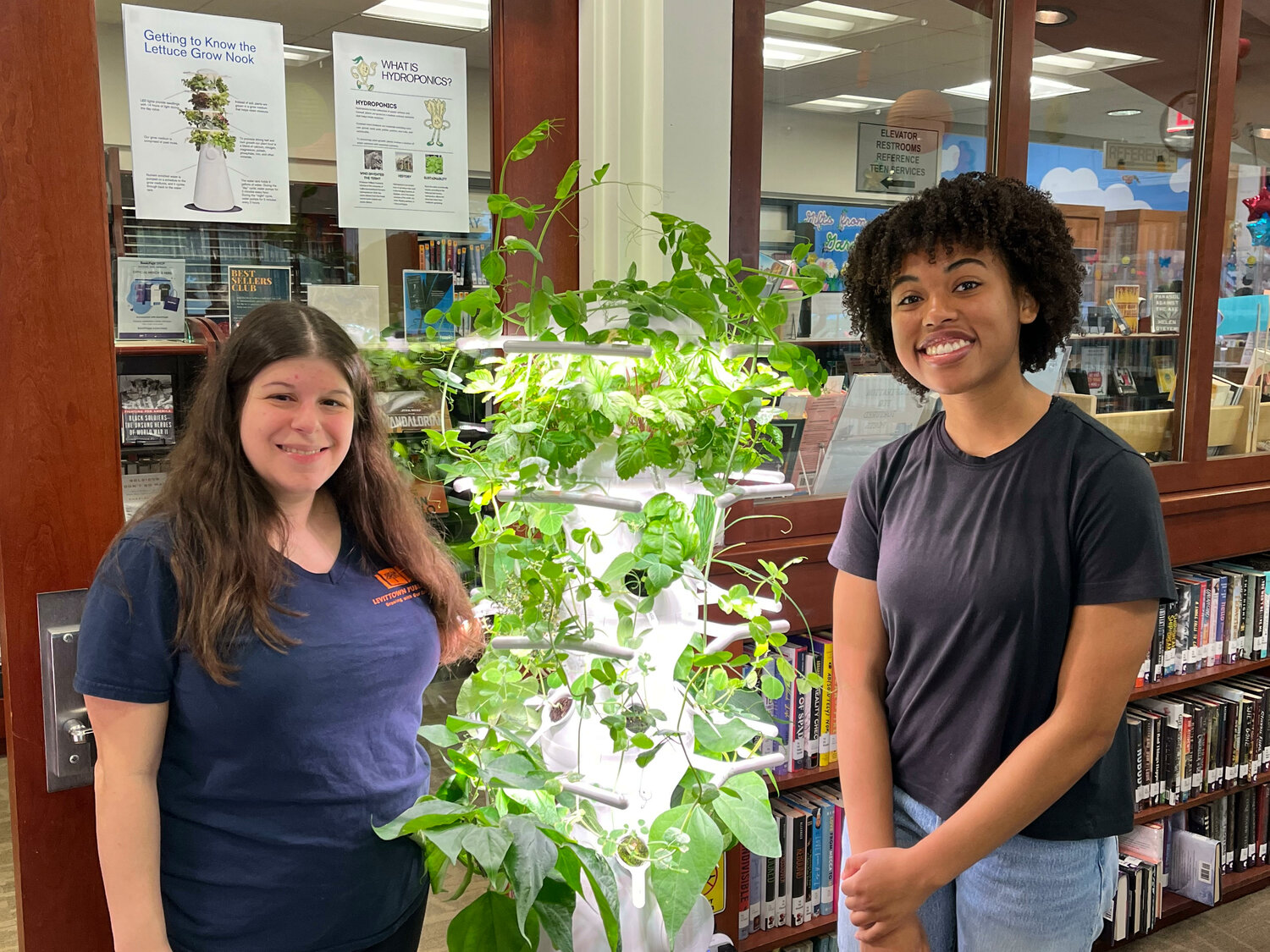Levittown library teaches sustainable gardening with hydroponic garden
At Levittown Public Library, kids are learning unique methods to grow plants, thanks to a hydroponic garden that grows anything from basil to strawberries.
Hydroponic gardening differs from traditional gardening because it does not require soil. According to Christina Reed, a sustainability intern at the library, plants are grown in a grow medium, comprised of peat moss, that helps retain moisture. The water used for hydroponics is enriched with nutrients, allowing plants to grow “in a smaller footprint.”
“Overall, hydroponics is a more sustainable method of growing,” Reed said, “and we thought that this is something that could be a great opportunity for students to see and be more interested in the environment and growing.”
Reed said she has always been involved with community and library gardens, and saw the hydroponic garden as an alternative method of growing plants in the library. She first heard of hydroponics several years ago, and became interested around the time of the pandemic.
“There wasn't a lot of access to supermarkets, and it was more of a lockdown environment, that I thought this would be a great initiative to bring to my house,” Reed said, “and so rather than having a traditional garden, I thought this would be a fun challenge.”
Now, Reed said, she has several hydroponic gardens at home growing different varieties of plants, including cauliflower, peppers, zucchini, cucumbers, lettuce, strawberries and bok choy.
She applied for a grant in July of last year to the Pollination Project Foundation, an organization that provides micro grants to individuals making positive changes in their communities. This allowed her to receive the funds to start a hydroponic garden at the library, focusing on children's education.
The library received the garden in March, and has been growing a wide variety of plants since. According to children’s librarian Sarah Aiosa, the library’s staff members first grew kale, and then made them into chips for a taste test challenge for a kid’s program. Since then, the garden has grown string beans, strawberries, mint and tomato, among others.
“Everything that we do, we start completely from seed,” Reed said, “and then we grow it to become full sized and ready to eat.”
Maintenance, Reed said, is required once a week, where nutrients are added to the system, and water is refilled and adjusted for acidity. With hydroponics, Reed said, the plants won’t grow if the water is too acidic. As plants get larger, she’s continuously trimming and harvesting foods to allow for more plants to grow.
“We do always have at least one person just taking a peek at it every day, just to see that everything's going the way it should,” Aiosa said.
Jessica Carruba, the library’s head of teen services, said she’s been impressed to see how much has grown from the hydroponic garden, and hopes to see more programs related to the plants grown from it.
“This has been a wonderful surprise to see how easy it is to maintain once you understand how the system works,” Carruba said. “The amount of produce that it yields is incredible.”
The garden can hold up to 20 plants, but the library is only growing several batches of different plants at a time. Some plants require more maintenance, such as strawberries, which need pollination. Since the garden is inside, there’s no wind, birds or bees to carry pollen to the strawberries, so a hand pollination tool is used.
“When you're outside, there's bees and hummingbirds that are able to hand pollinate these plants,” Reed said, “but we'll have to do it mechanically and by hand. So we’re continuously spreading the pollen to these plants individually rather than it being through nature.”
Additional programs for students to learn about gardening include taste tests with greens, such as green beans, and using the plants for ingredients, such as mint lemonade and strawberries in salad.
Aiosa said the library has worked with the community to donate some of the plants to soup kitchens and the Good Shepherd Lutheran Church in Levittown, where the food went to a family in need.
Reed also noted that while the garden’s output is limited, the focus remains on education and hands-on learning. By involving different library departments, the goal is to give students and community members a better understanding of sustainable gardening practices.
“With the spatial limitations, it’s not going to feed the entire community,” Reed said. “We really just wanted it to be an educational tool that can then be brought to different departments within the library.”






